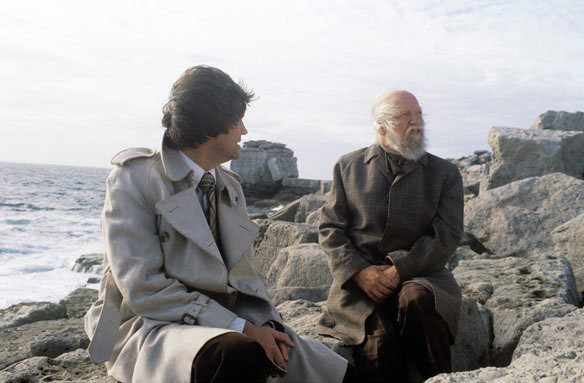On Sky Arts, Melvyn Bragg has revisited classic episodes of his South Bank Show from the last thirty years, with new contemporary interviews, and Bragg’s reflections on the original experiences with his guests. Bragg interviewed William Golding in 1980, shortly before Golding was awarded the Booker Prize for Rites of Passage, and three years before he received the Nobel Prize for literature.

Image ©copyright www.theguardian.com
Bragg recalls that Golding was reluctant to appear on television and Bragg went to visit him and his wife Ann at their cottage in Salisbury in an attempt to persuade him. Bragg said that he ‘and Bill drank too much’ and he left the Goldings without a firm response to his interview request. Golding telephoned him shortly afterwards and explained that the Ancient Assyrians had a code –they discussed serious matters twice; once when drunk, and once when sober. Golding arranged to meet Bragg again at the Dorchester Hotel, where they drank tea, remained sober, and Golding agreed to appear on the programme!
The programme featured a number of locations from Golding’s life: the house in Marlborough, Wiltshire where he grew up, Golding’s thatched cottage in Salisbury, Salisbury Cathedral, and a wonderful segment of interview by the sea, a major source of fascination, inspiration, and fear for Golding.
Bragg asked Golding about his experiences in the Second World War, when Golding was in the Royal Navy and Golding explained that it changed how people viewed human nature: ‘Bit by bit, we discovered what the Nazis were doing. [They were] a highly civilised group who were doing impossible things’. Golding realised from this that if the social system was altered, it could change the way humans behaved. This went on to become one of the most prevalent themes in his novels.
Somewhat inevitably, Lord of the Flies was the main focus of the programme. Golding discussed the moment of inspiration for the novel; sitting across from his wife in front of the fire, having just read stories about islands and adventures to their children, he said to Ann that he should write the real story about what would happen if children became stranded on an island. With Ann’s encouragement that is exactly what he did. He talked about his unsuccessful writing prior to Lord of the Flies – three finished novels that were rejected by publishers. He felt that he needed to write ‘something individual’ to him and that Lord of the Flies eventually unfolded in his mind, as if he were seeing a film in his mind’s eye.
Nigel Williams, who adapted Lord of the Flies is one of the contemporary additions to the programme and he says of Flies and The Inheritors: ‘They could be moved to any epoch’. They are about one group of people suddenly deciding that another group is wrong. He felt that the timelessness of Golding’s works was a key factor in the award of the Nobel Prize.
Perhaps my favourite moment of the programme was Bragg’s interview with Golding by the sea. Bragg recalled how Golding seemed mesmerised by the sea and Golding said that he could stare at the sea for hours, watching ‘wave after wave’. He found it hard to concentrate on the interview at this point and that a recent shipwreck with wife Ann, daughter Judy and some friends had forced him into a decision to stop sailing. The sea makes frequent appearances in his novels, Pincher Martin in particular, and Rites of Passage, which at the time of the interview had been his most recent book.
In the concluding part of the programme, Golding said that he was a storyteller: ‘You’ve got anybody if you can say “once upon a time” convincingly’. Bragg asked him what it was like to write for human beings; what influence a book can have. Golding replied: ‘Is it possible to make people more aware of their nature through stories? It might be so. Equally [it’s] just to entertain them while they’re waiting’. With that, Golding breaks into a delightful smile.

